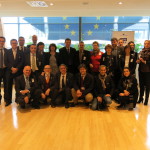 After its constitution on December 2nd, 2013, the new European Grouping of Territorial Cooperation “Cities of Ceramics” (AEuCC in short) held the Foundation Assembly in Brussels on January 31st, 2014, in conjunction with the session of the Committee of the Regions of the European Union. In the Foundation Assembly of AEuCC, Antoine Di Ciaccio (Aubagne, France) was elected as President, Stefano Collina (Faenza, Italy) as Vice President and Giuseppe Olmeti (Faenza, Italy) as Director of Projects.
After its constitution on December 2nd, 2013, the new European Grouping of Territorial Cooperation “Cities of Ceramics” (AEuCC in short) held the Foundation Assembly in Brussels on January 31st, 2014, in conjunction with the session of the Committee of the Regions of the European Union. In the Foundation Assembly of AEuCC, Antoine Di Ciaccio (Aubagne, France) was elected as President, Stefano Collina (Faenza, Italy) as Vice President and Giuseppe Olmeti (Faenza, Italy) as Director of Projects.
The European Grouping of Territorial Cooperation (EGTC) is a European legal instrument designed to facilitate and promote cross-border, transnational and interregional cooperation: it enables regional and local authorities, and other public bodies from different member states, to set up cooperation groupings with a legal personality.
The members of AEuCC are four longstanding national associations of cities of ceramics based in Italy (AiCC), France (AfCC), Spain (AeCC) and Romania (ArCC). Each of them represents cities with “ancient ceramic tradition” (Italy, 34 cities; France, 22 cities; Spain, 29 cities; Romania, 12 cities). In total, AEuCC comprises 97 cities.
The Italian Association of Cities of Ceramics was established in 1999 under a national law. In its wake, in 2003 the French Association was developed, followed in 2007 by AeCC in Spain and ArCC in Romania. The four associations had a strong and continuous cooperation until they decided to constitute an EGTC.
AEuCC was set up to develop territorial and transnational cooperation in the field of ceramic art and craft, with the objective to create social and economic cohesion. Sectors of intervention are: cultural, artistic, ethnographic heritage; ceramic-related tourism; ceramic craft; vocational training and competitiveness; events to enhance knowledge and good practices; production processes, energetic efficiency and saving, environment and quality of life, pollution reduction; analysis, studies and researches on economic development and employment, innovation, new technologies, business practices, internationalization, clustering, patents and intellectual properties; promotion of new national association of cities of ceramics.
It’s important to underline that, according to Article 20 of the Statute, AEuCC is open to new members, which need to be “associations of cities of ceramics” (at least three cities from the same country). In order to foster the entrance of new members, single cities willing to create a new association will be granted an observer status, which will allow them to take part in AEuCC works and projects. In this perspective, the foundation assembly of the Hungarian Association of Cities of Ceramics is expected to be held on April 25th, 2014. Other developments in this direction are under discussion in Germany, Poland and Slovenia; other interested nations, given their ceramic tradition, could be Great Britain and Portugal. Höhr-Grenzhausen, Selb (Germany), Gmunden (Austria), Bolesławiec (Polonia), Delft (The Netherlands), Stoke-on-Trent (Great Britain) and Canton Ticino (Switzerland) might in fact be single cities that – in the coming future – could join AEuCC as observer.
Antoine Di Ciaccio, President of AEuCC, declares: “European Associations of Cities of Ceramics share the same objectives, namely to enhance economic development of ceramic art and craft, to promote production areas and to “protect” ancient techniques and traditions. Exchanges between professionals, knowledge sharing, creation the conditions for a European market of ceramics: these are the actions required and present in the agenda of AEuCC, starting from the fact that the operators of the ceramic system are a key component of the identity of territories and a fundamental element in touristic and economic development.
“A significant start-up – says Vice President, Senator Stefano Collina – that rewards the determination that the national associations have shown during two years of preparation and finalization of this new European body. The actual impact of AEuCC will be the development of a series of benefits that we have already been able to appreciate in part, thanks to the relationships activated in the past between cities of ceramics. Thanks to AEuCC, exchanges between potters from different countries, difficult in the 90s, will become more and more diffused, improving professional skills and enabling ceramists and territories to achieve attractive market opportunities”.
Regarding the first actions of AEuCC, Giuseppe Olmeti, Director of Projects, comments: “We are discussing a number of projects that AEuCC aims to implement, in particular related to European programs such as Europe for Citizens, Erasmus + (we’re considering a “CER-asmus” for young entrepreneurs in the ceramic field), INTERREG and Creative Europe. We’ll be working together to achieve the following goals: development of projects and services for the ceramic sector stakeholders; fund-raising in relation to the development of these projects; creation and management relations and networks in the ceramic field”.